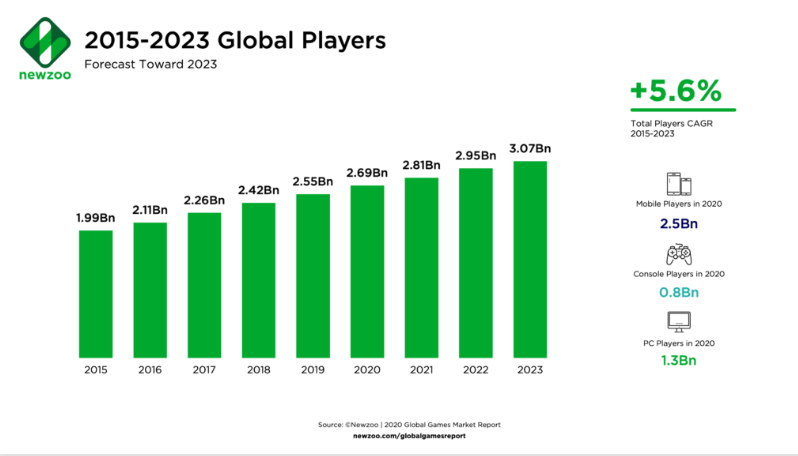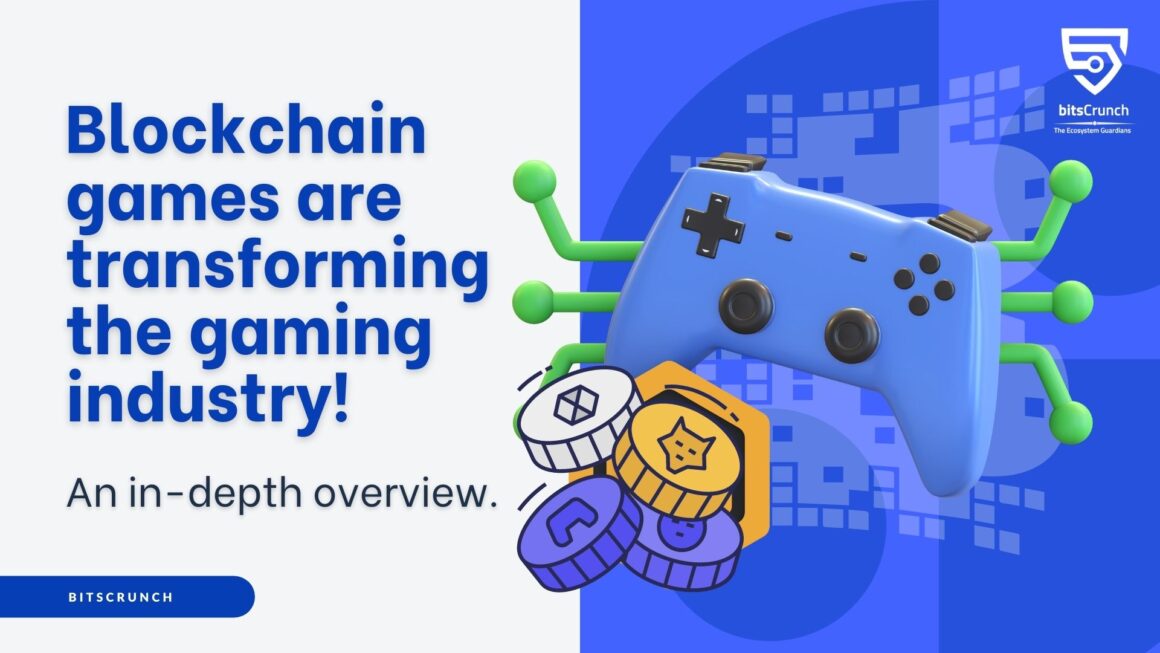Blockchain games are transforming the gaming industry! – An in-depth overview.
When remembering the modest inception of the gaming industry, all that strikes is the Super Mario game that we all played on a 16-bit console. But where are we now? Cryptokitties, Gods Unchained, Decentraland, The Last Will, and more! As technology accelerates to new heights, the gaming industry goes from pure fun to play-to-earn.
Blockchain games – The next big thing?
Blockchain games have been all over for a few years now. Specifically, recent years have seen a dramatic spike in the number of blockchain games released. Businesses interested in creating decentralized gaming applications now have access to this technology. Not just that, the gaming market is predicted to grow by $US 125.65 billion in 2020-2025. What’s contributing to this growth? How is blockchain transforming the gaming industry? It’s worth knowing!
What is blockchain gaming?
The gaming industry is always hungry, and with blockchain by its side, we can only see the disruption. From ownership to royalties, from finding rare items to acquiring trinkets, the 3 billion gamers worldwide are all set to get more from this technology that is capable of addressing many pain points. So, what is blockchain gaming?
Blockchain gaming relies on blockchain technology to ensure everyone owns a copy of what they are playing, not just one entity. To accomplish this, we will need a Smart Contract, which governs actions on the blockchain. Blockchain gaming uses the same technology as cryptocurrencies, including Bitcoin and Ethereum, to create true item ownership. It is seen as a boon by gamers who often get stuck with in-game entities.
There’s more!
Blockchain gaming technology allows gamers to customize their gaming items, develop their characters, and make them unique. They can also transfer them to other users and trade them on the platform. As a result of this unique feature, users tend to gravitate towards blockchain gaming as they can own the game assets while playing independently.
Gaming is also likely to appeal to blockchain enthusiasts. Many rare and valuable NFTs are traded within gaming industries, exemplifying this trend. In the future, blockchain will play an integral role in financial technologies. Incorruptible ledgers are gaining traction beyond bitcoin debates. Developers who want to expand their games to include user-friendly features can rely on blockchain tech, which is crucial for hosting a decentralized banking system.
What are the key drivers and market trends for this adoption?
P-2-P transactions
Gaming industries are integrating blockchain technology into their systems to facilitate peer-to-peer transactions and enable players to trade virtual assets in-game. Companies and console manufacturers are embracing this paradigm shift. Most recently, Microsoft announced its plans to incorporate blockchain into Xbox.
Monetization
Using blockchain will enable developers to monetize their gaming services efficiently and provide fast and secure payment networks. Gaming companies achieving substantial growth opportunities during the forecast period is another driving factor.
NFTs
NFTs allow gamers to truly own their digital assets. By eliminating an intermediary like another player, players can regulate and control their items.
Play & earn
A new sub-genre is now a buzz – Crypto-Games, where players earn cryptocurrencies (or digital currency) by participating in the game. In these games, players can buy items with cryptocurrency or convert them into real money. How? A cryptocurrency is rewarded for playing these crypto games so that you can redeem it in the real world.
Virtual events and tournaments
The gaming industry is not complete without virtual events and tournaments. Blockchain technology can make many processes easier by tracking and verifying the winners of competitions. Furthermore, decentralized and secure transactions among users and automatic data monitoring from any network give gamers an easy way to get the most out of blockchain games.
Cloud gaming
Another factor that is helping the gaming market share grow. Streaming video games online is now possible via cloud gaming technologies. Mobile gaming and social media are helping boost it further. Cloud gaming’s cost-effective price structure offers non-core gamers the opportunity to enjoy games on social media and mobile devices. A cloud-based platform is used for storing and streaming games. Thus, PCs can access it with less storage and processing power. High-end graphics cards and PC upgrades are eliminated by using cloud gaming and can play on any device.
Market trends
Globally, there will be 2.5 billion mobile gamers by the end of this year, 1.3 billion PC players, 0.8 billion console gamers, and 2.5 billion playing on mobile.

The global market will surpass the 3-billion players mark in 2023, showing a 5.6% annual growth rate (2015-2023). Let’s also examine the gaming market during the forecast period.

Now, what are the traits of the gaming industry that are zipping way for blockchain?
- Developing and monetizing games requires a safe, secure, and isolated environment since players must sell and buy assets inside the game.
- You need some fat money for playing games. Most gamers use funds to obtain in-game assets.
- Interoperable profiles. A feature where players are playing multiple games can create different profiles.
- Assigning value to intangibles. We will see real money spent on virtual games as people project value on intangible assets. Sectors that enter this phase are prime for disruption.
- When not playing the games, the security of virtual gaming assets is needed to keep the hacker party away.
- Now more than ever, gamers seek to own their in-game assets and the gaming company. It poses one more opportunity for the technological interruption.
- With blockchain, no more shutting down of games or changing rules without gamers being a part of it.
- Talented gaming developers will be identified and provided opportunities with exciting roles.
- This will change gaming forever if technology lets players and developers collaborate closer.
- Providing a free hand for developers to create rare collections and blocking roads for fraudulent transactions are among the long list where blockchain can transform the gaming industry.
How can blockchain help transform the gaming industry?
A secure environment
There is nothing like the decentralization system of blockchain for protecting your data from hackers. Since this system consists of blocks, and every block contains different information, hackers can’t break the algorithm. Additionally, it increases the productivity of developers and entrepreneurs by creating a safe, secure environment.
Enables safe trading platforms & resources
With blockchain technology, developers and gamers can build resource-rich games and apps, earn rewards in games and upgrade game versions. Additionally, players can buy and sell in-game assets. Participants can trade their items and earnings for profits. It is impossible to steal or duplicate items since Blockchain records each item’s ownership.
Integrated profiles
Creating a gaming profile needs access to the gaming platform’s features. Blockchain technology facilitates various games through a centralized network. Users can create a single profile to use across platforms, making it easier to navigate games and purchase items.
Enhanced user experience
Users can access digital assets and engage in digital transactions more efficiently, securely, and transparently through blockchain technology. Gamers benefit from greater control through blockchain technology. Players can download games from a range of locations in different versions without compromising their gaming experience. The ability for players to create characters, write their own stories, and even play has contributed to this trend.
Value projection of intangible assets
After the Crypto Kitties game was launched, approximately $6.7 million was invested by players. A creative blockchain game shouldn’t surprise you if players are willing to pay real money for intangible digital assets. The key is to create a fun game. According to these trends, players will prioritize intangible digital collectibles when a new game comes to the market.
Earning rewards & trading resources
Completing quests and missions can earn players cryptocurrency rewards. Whereas a traditional game rewards players with points that have no monetary worth in the real world. Cryptocurrency earned can help players purchase items from other gamers or e-commerce websites. The games also allow players to trade items. As blockchain records every item and its owner, players can achieve freedom from copying or theft.
With blockchain technology’s decent and potential benefits, are there any disadvantages with blockchain rooting into the gaming industry?
The cons that need our attention!
Even so, blockchain has created new challenges for various businesses. What are those limitations?
Competition in the marketplace
The gaming industry is fierce, with a constant stream of new games and platforms. Therefore, blockchain-based games may have a tough time competing against traditional games.
It’s a question of regulation.
There is a compliance challenge for a few cryptocurrencies, such as MANA, Theta, and more, as regulators are still figuring out how they work and if they can be used in blockchain gaming.
Systematically intricate
In crypto games, the difficulty is not in the storyline but instead in the gameplay. A player’s first step is to create a user account, an easy process. But then starts the real challenge. These crypto wallets depend on the type of blockchain game. So, buying specific crypto to align with the game’s blockchain is not an easy process.
The way forward – More to be done?
Even though it might sound perfect, it still needs a lot of fine-tuning. These platforms have to balance things like what can be purchased, how they can work with each other, security, and sustainability. That is no small task.
So, folks, yes, blockchain in the gaming industry might become something truly revolutionary. Can we safely say the technology is about to bring a major paradigm shift in the way things are done? Is Gamification set to bring positive changes? Just wondering if time can answer this dilemma. So, when are you joining it? Meanwhile, need more such informative content? Whole good stuff awaits only at bitsCrunch!
The post How is Blockchain transforming the Gaming Industry? appeared first on bitsCrunch.
